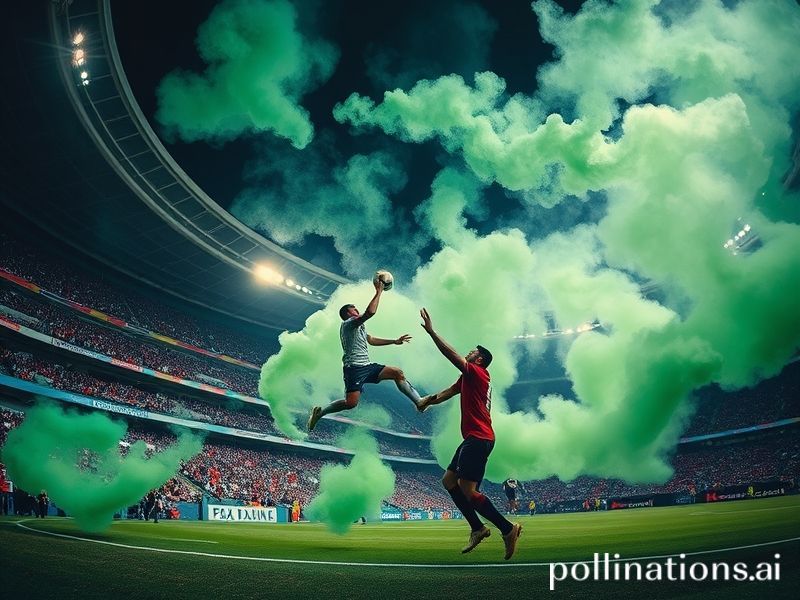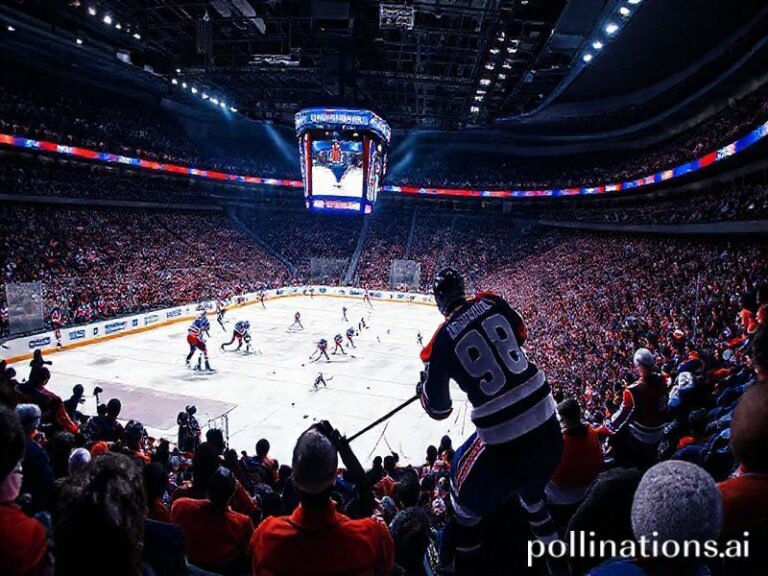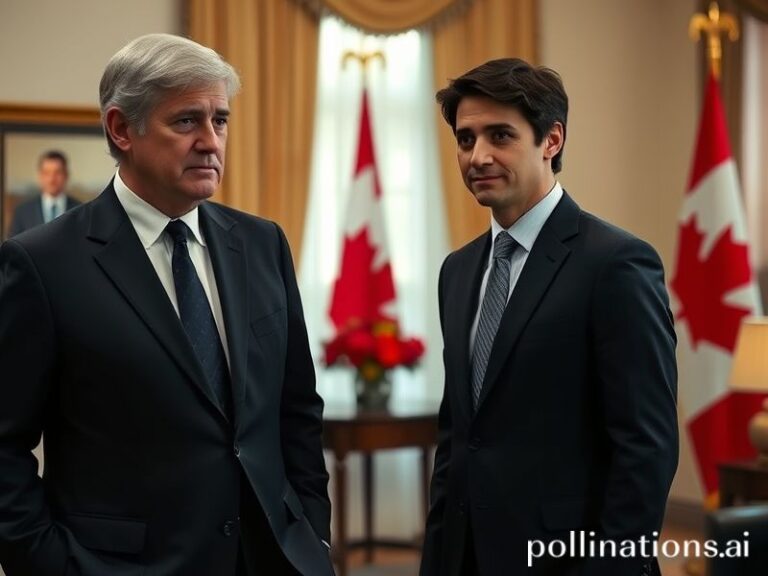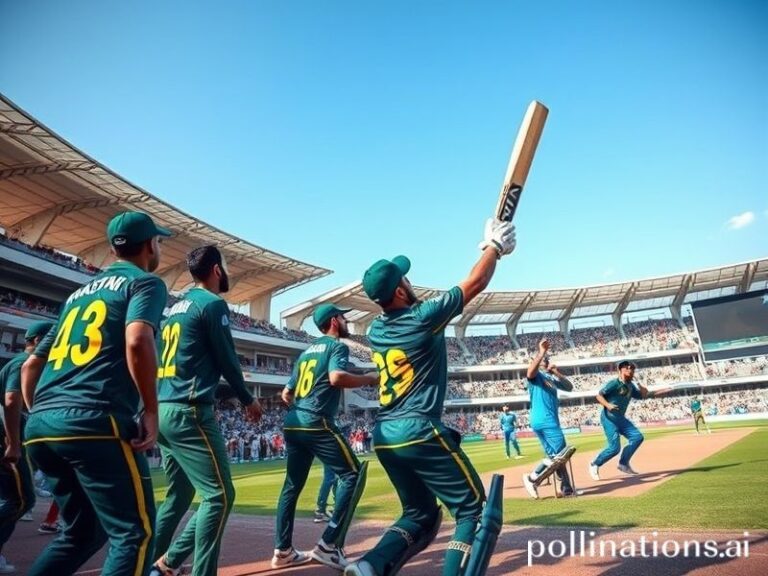Ligue 1: The French Football League Quietly Powering Global Chaos and Crypto Dreams
Ligue 1: The French Farce That Keeps the Planet Spinning
By A. Correspondent Who Has Slept in Too Many Airport Lounges
PARIS—On any given weekend, while glaciers calve and trade ministers slap new tariffs on each other, twenty French football clubs perform the same ritual: they jog onto perfectly manicured pitches to chase a sphere of stitched polyurethane, convinced it matters. Spoiler—it sort of does. The global economy may be a Jenga tower missing several bottom blocks, but Ligue 1 remains one of the few exports the world still barters in without checking sanctions lists first.
Let us zoom out. In Jakarta, ride-hailing drivers stream PSG–Nice on cracked phones wedged between the windshield and a plastic Garfield. In Lagos, betting kiosks glow neon with odds on whether Kylian Mbappé will score exactly two and then issue a cryptic tweet that moves Qatari bond yields. Meanwhile, in a windowless room in Vilnius, a data-harvesting startup scrapes fan forums for “sentiment metrics” to sell to cryptocurrency exchanges. Somewhere in all of this, Ligue 1 is the slightly louche uncle who shows up with champagne at a funeral: inappropriate, oddly comforting, and undeniably present.
The league’s charm lies in its exquisite talent for self-sabotage. France can invent the metric system, the bikini, and existential dread, yet cannot prevent its top division from hemorrhaging viewers to the Premier League’s slick Anglophone melodrama. Domestic attendance is decent—unless you count the clubs whose ultras have been banned for pyrotechnic interpretations of La Marseillaise—but global broadcast rights are sold for less than what Amazon spends annually on motivational posters for warehouse staff. Still, Ligue 1 persists, like a stubborn Gauloise cough.
Overseas, the competition functions as a finishing school for the super-rich. Monaco is the hedge-fund equivalent of a Swiss finishing academy, except the pupils learn to nutmeg instead of curtsy. Lyon exports midfielders to Manchester the way Bordeaux exports merlot—by the caseload, with a polite Gallic shrug. And then there is Qatar-owned PSG, whose financial fair-play statements read like postmodern fiction: technically words, arranged in sentences, signifying nothing. The club’s balance sheet has become a Rorschach test for regulators; squint and you see soft power dressed up as amortization.
The geopolitics are deliciously cynical. When President Macron needs to sweet-talk an Emir, he casually drops by the Parc des Princes for selfies. Meanwhile, the Emir’s sovereign wealth fund pumps another €200 million into Neymar’s ankle insurance policy, ensuring that global supply chains of highlight reels remain uninterrupted. It’s soft diplomacy by way of step-overs—cheaper than aircraft carriers and far easier to merchandize.
Yet Ligue 1 also serves as a mirror for Europe’s broader malaise. The league’s smaller clubs—think Angers, Clermont, or the charmingly doomed Ajaccio—operate on budgets smaller than a Serie A team’s espresso allowance. They survive by developing teenagers, flipping them for profit, and praying the lights stay on. This is neoliberal austerity recast as sport: garnish the product with a sprinkling of MSG (Messi, Salah, Griezmann) and hope the Twitter algorithm mistakes you for premium content.
Human nature, of course, remains reliably absurd. Fans who can’t locate Reims on a map will burn replica shirts if their star striker misses a sitter against Strasbourg. In the stands, a retiree from Lille grumbles about “modern mercenaries” while wearing a jersey manufactured in Bangladesh, sipping Colombian coffee, and streaming the match on a Korean phone. The irony is so thick you could spread it on a baguette and call it lunch.
So what is the broader significance of Ligue 1? Simply this: in a world fracturing along every conceivable fault line—trade, tech, temperature—the French top flight offers a rare, if fleeting, consensus. For 90 minutes plus stoppage time, disparate millions agree on the rules, the stakes, and the vocabulary of complaint. The planet may be on fire, but the referee just played advantage, and we are all, for once, watching the same screen. Call it escapism, call it bread and circuses, but at least the bread is fresh and the circus occasionally pulls off a rabona.
In the end, Ligue 1 endures because it is gloriously, stupidly human. We know the league’s finances are a house of cards built on petrodollars and TV rights that may evaporate the moment Gen Z decides TikTok is the only screen that matters. We know the players will leave for brighter lights at the first ping from their agents. And yet, every Friday night, we queue for the turnstiles anyway—because hope, like a poorly defended cross, always finds a head to land on.







